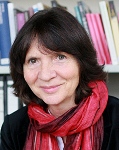Aleida Assmann receives the Max Planck Research Prize 2009
12. February 2009
Prof. Aleida Assmann, appointed in 1993 as Chair of English and General Literary Studies at the University of Konstanz, has been awarded the renowned Max Planck Research Prize 2009 for her pioneering interdisciplinary work in the research field of history of memory. “In works resonating with a broad public, she has inspired debates about the memory of the Holocaust and the creation of a European memory culture,” in the awards statement of the Alexander von Humboldt Foundation and the Max Planck Society, which together designate the research award recipients. The prize is financed by the Federal Ministry for Education and Research and will be formally awarded by Federal Research Minister Annette Schavan on the 20th of October at the University of Bonn.
Assmann, considered one of the most prominent literary scholars in the world, studied English and Egyptology in Heidelberg and Tübingen. In 2008, she was granted an honorary doctorate by the University of Oslo. She will receive 750,000 EUR in prize money. Another 750,000 EUR will go to Prof. Karl Galinsky, Professor of Classics at the University of Texas at Austin who also works in the field of cultural research.
The Max Planck Research Prize funds German and non-German scholars in disciplines regarded as particularly promising. The awards are conferred upon one researcher in Germany and one working abroad who are each expected to achieve scientific excellence in a framework of international cooperation. The prestigious prize is awarded annually in the areas of natural and engineering sciences, life sciences, and the humanities.
The winner on the significance of the award and her plans. more...
With the award money, Assmann plans to intensify her research on the history of European memory and to expand the Constance-based international network for memory research. "The awarding of a Max Planck Research Prize for research on ‘history and memory’ demonstrates the continuing relevance of a new research area that has developed less within than between various individual disciplines,” Assmann said on the occasion of the prize. Assmann wants to create new forums for interdisciplinary exchange in addition to more job opportunities for junior scholars. Her future research will continue in three fields of memory studies: the particulars of German memory will be examined against the background of democratization after two dictatorships. In the European context, her focus will be on memory after 1945 and 1989. Lastly, she will examine contemporary non-European sites where the return of a traumatic past divides society and impedes the prospect of a common future.
Aleida Assmann is a board member of The Center of Excellence "Cultural Foundations of Integration" at the University of Constance. In 2006, this center became the first joint research project in the humanities to be sponsored by the Federal Excellence Initiative of Germany.
In the current academic year, Assmann is a research fellow in the Institute for Advanced Study Konstanz. For the duration of her grant, she is working on the updated summary of her studies in memory that will appear in English translation (with co-author Jan Assmann), thus facilitating linkages with other international forums. Among other things, Aleida Assmann published a basic introduction to Kulturwissenschaft in 2006. Her latest book, "Der lange Schatten der Vergangenheit. Erinnerungskultur und Geschichtspolitik” [The Long Shadow of the Past: Cultural Memory and the Politics of History] also appeared in 2006 with C.H.Beck.
